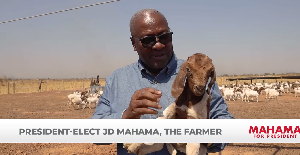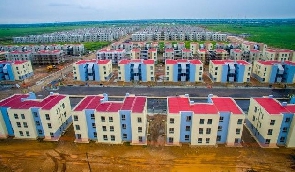“Men will wrangle for religion, write for it, fight for it and die for it-anything but live for it” Charles Colton
“If you go to heaven without being naturally qualified for it, you will not enjoy yourself there” Bernard Shaw
Billaw………in the past few years, I have consistently maintained that I shall not write to you anything associated with religion or anything with the semblance of it.
The reason, as you are already aware, is grounded on the fact that, I consider religion to be so numinous and a thing sacred that any attempt to ascribe meanings to it according to our “human understanding” is to light up our emotional embers of prejudice and self-serving bias.
This, to a larger extent, and without more, could potentially throw the whole country into an irretrievable enclave of religious conflict as we see in other countries ,with a consequential effect of bringing the entire nation to a standstill. It is for this reason that I refused to comment. It is for this reason that I refused to write.
The above firm conviction notwithstanding, the saying that it is cowardice to admit silence in the face of any real or preponderance of injustice may appear to be true, and I agree without more.
Yet, I shall not go into the nitty-gritty of the whole subject matter of contention and still present my case to the understanding of the ordinary man. I promise!
Discrimination in Ghana : Real or imagined
Be that as it may, happenings in our country in the last two weeks as regards to religious tolerance and discrimination, as the two competing schools of thoughts elect to describe it, appear to be a disturbing trend that cannot be ignored without any comment.
Indeed, the above development has drawn much public attention and opprobrium in the comity of nations that, hardly does one listens to a news bulletin without the mentioning of “Religious Discrimination”.
Slowly without notice, this sad development is sinking our image to the foreign investors as we seek to play our usual political games out of the nuances of the pettiness of pedestrian political propaganda while allowing the root causes to spread further.
Unfortunately, the media fraternity has not also helped matters as it gives it some undue attention, heightening emotional tensions through the boisterous buffoonery of call-in and studio discussions on the subject matter.
To all intents and purposes, it was unnecessary, as it was needless and pointless, and indeed, to the very core, untenable to say the least.
It cannot be gainsaid that religious discrimination exists in our country. There is no any aspect of human existence that does not admit of discrimination.
As provided for under article 17 (3) of the constitution, 1992, to “discriminate” here means to give different treatment to different persons attributably only or mainly to their respective descriptions by race, place of origin, political opinion, colour, gender, occupation, religion or creed…..”
It is therefore tenable to argue that, in our daily interactions with others, we consciously or unconsciously demonstrate our level of discrimination in our work places or when expressing our political thoughts, and indeed, even in our homes we do so through gender roles. Whether by reason of where we come from or our colour as a people, we are likely to find discrimination.
Whether by reason of the religion we profess and practice or by reason of our tribal identity, there is the likelihood of discrimination. Sadly, like all other discriminations, we feel reluctant to express their existence as they happen, or more accurately perhaps, feign ignorance of their existence. Are we hypocrites or cowards? Maybe a combination of both!
So you see, I have demonstrated beyond any reasonable doubt that discrimination, whatever form we may want to present it, whether real or imagined, does indeed exists in Ghana and that its existence is largely our own making, an offspring of our conduct.
The media cacophony cannot and should not be relied on in solving this issue. Neither will the adamant stands of the two competing schools of thought in the battle of “religious supremacy” resolve the impasse. It requires more of a round table discussion than muscle flexing and show of egos!
Hypocrites or moral zealots
To admit that there is no discrimination in Ghana in whatever shape or form it may be presented is to admit that the ant is the father of the elephant. Sometimes, our sincere level of hypocrisy does not allow us to simple admit its existence.
As submitted above, perhaps, even more than we could have imagined, there are daily acts of discrimination in our homes and work places than religious discrimination or intolerance. This affects the victim in the same magnitude as it does through religious discrimination.
What differentiates them is that, while we hold the consequential effects to be true in either case, we tend to ascribe undue emotional attachment to the latter, taking unyielding stands and justifying our “nonsense”, sometimes, with the little copycat knowledge in our possession as weapons, and in the worst case scenario, without any locus standi, completely ignorant and bereft of facts, we act more catholic than the pope.
As Albert Einstein puts it “We should take care not to make the intellect our god. It has powerful muscles but no personality” This situation, if left unchecked, is perhaps, more devastating and inflammatory than the discriminatory act itself.
Asuuming Ghana were a traditional state
And indeed, Ghana was a traditional state before the coming into effect the foreign religions that we now hold in high esteem. This means that, once upon a time in Ghana, all our great grandfathers were traditional believers before the advent of Christianity and Islam.
We cannot pretend to say we are unaware of this basic fact, as that will amount to denying ones identity and history. And it does not mean by reminding ourselves of this basic fact, we have no faith in our current religious status.
It means we have grown to a stage in history where we should tolerate the choices others make as regards their faith. Truth be told, there is no known religion in the world that teaches hatred and discrimination, these are our own inventions t claim some undeserved “religious supremacy’ “This does not make much sense, and indeed, to a larger extent, amounts to infantile nonsense.
Be that as it may, equally assume that by natural providence, your parents were Christians/Muslims, would you have had the moral effrontery to condemn the acts of Christianity/Islam as the case may be? As Ethel Watts puts it “God gives us our relatives, but thank God we can choose our friends”.
We do not decide whether or not our parents should be Christians/Muslim, and the fact that you were born a Christian/Muslim does not give you the unfettered right and license to “misbehave”. Let’s not dwell ourselves on matters that are inconsequential. We have a nation to fix, let’s be focused. Indeed, faith is too special a thing to be left to the determination of another man.It is a thing so unique. It is a thing sui generis.
A peep into the 1992 Constitution
Knowing the effects of discrimination to the development of a nation, taken into account the cultural practices of the people of Ghana, realizing the different sects of religions in the country and their volatility, desirous of building a formidable nation together for our unborn children and reaffirming our collective interest of fostering unity; and in choosing for ourselves a sovereign state, we the people of Ghana have criminalized any act of discrimination in our constitution, 1992.
Under article 17 (2) of the constitution, 1992, it stipulates that “a person shall not be discriminated against on grounds of gender, race, colour, ethnic origin, religion, creed or social or economic status.”
To discriminate under article 17 (3) means to give different treatment to different people attributable only or mainly to their respective description by race, place of origin, political opinion, colour, gender, occupation, religion or creed……”
It is instructive to note that, the letter and spirit attached to these constitutional provisions are very much alive and valid at the time that the constitution was promulgated and perhaps, more relevant now than ever in our relentless efforts and quest to securing for ourselves, a nation free of discrimination.
Consequently, no person or authority or head of any public institution whatsoever, is clothed with the powers to make any law that will seek to discriminate against any person or group of persons on religious grounds. Any law or rule made in such a manner is definitely not within the contemplation of article 11 of the constitution, which provides for the sources of laws in Ghana.
Indeed, the supremacy of the constitution, 1992 as espoused in article 1(2) of the constitution demands that such, “rules” be deemed null and void and of no legal effect whatsoever. Thus, any law found to be inconsistent with any provision of the constitution shall, to the extent of the inconsistency, be declared null and void. Furthermore, article 17(1) makes all persons equal before the law.
Equality before the law presupposes that a person shall not be treated differently from others in similar circumstances on grounds of his religious beliefs. It is tenable to argue that, the “rules” passed by Achimota SHS and that of Methodist Girls’ SHS are not, and cannot be more supreme than the constitution of Ghana.
This explains why most constitutional law students are more likely to agree than to argue that, the decision to deny a student admission and to prevent others from practicing their religion is not justiciable and indeed, legally defective.
Click to view details



Opinions of Saturday, 15 May 2021
Columnist: Bassing Kamaldeen



















